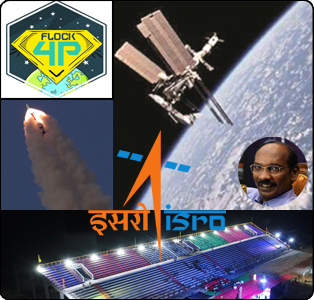India Presses Ahead with Ambitious Launch Schedule and Future Mission Plans
ISRO is readying PSLV-C47 to launch Cartosat-3 on November 27 from Satish Dhawan Space Center (SDSC). Originally planned for 2014, the Earth observation satellite is to image with panchromatic resolution of 25 cm – an impressive metric that sets Cartosat-3 apart from existing technology – within a 16-km field of view from a sun synchronous orbit of 509 km. Onlookers will witness PSLV XL configuration with 6 additional strap-on solid rocket boosters being utilized from Launch View Gallery at SDSC. Secondary payloads were brokered by the recently formed commercial wing of ISRO, NewSpace India Ltd, including ‘Flock 4p’, composed of 12 next generation CubeSats made by Planet, an American enterprise. This launch, along with RISAT 2BR1 and RISAT 2BR2 radar Earth observation satellites to be launched in December, if successful will put India in a position to match or exceed Europe in 2019 orbital launches – an indicator of the rising prominence of this spacefaring power. India is embarking on a range of space exploration missions – 1,500 kg Aditya solar probe is to launch to Lagrangian point L1 in April of 2020, Chandrayaan-3 will see a second attempt at the lunar surface in late 2020, and gaganaut (astronaut) candidates have passed medical checks and are poised to start training with Glavkosmos at Gagarin Center in Russia in preparation for human mission Gaganyaan in 2022. (Pictured: ISRO Chair Sivan; Image Credits: ISRO, Planet) |
MONDAYHighlights…
|

![]() = All times
= All times
for terrestrial events in local time unless noted.
![]() = All times for international terrestrial events in local time unless noted.
= All times for international terrestrial events in local time unless noted.
![]() = All times for space events, and…
= All times for space events, and…
![]() = All times for international space / astro events in Hawaii Standard Time unless noted. Add 10 hours to obtain UT (‘Universal Time’).
= All times for international space / astro events in Hawaii Standard Time unless noted. Add 10 hours to obtain UT (‘Universal Time’).
Weekly Planet Watch – Evening Planets: Venus (SW), Jupiter (SW), Saturn (WSW), Uranus (E), Neptune (S); Morning Planets: Mercury (ESE), Mars (ESE).
Japan Space Lunar Advances Through APRSAF, Space Generation and Moon Village Events
The Asian-Pacific Regional Space Agency 26th Forum opens November 26-29 at Nagoya Convention Hall in Japan, building on momentum from the Asia-Pacific Space Generation 6th Workshop Nov 23-24 in Nagoya, and leading to Africa Space Generation 3rd Workshop Nov 30 – Dec 1 in Addis Ababa. Space Generation Workshops are venues for students and young professionals to discuss space issues. Nov 26 of APRSAF is devoted to Space Applications for Environment and the Japan Kibo workshop. Following a Space Industrial Forum and working groups, Nov 28 will feature Evolving Space Activities in the Asia-Pacific Region, featuring Naoko Okamura (L) from Ministry of Education, Ishida Masayasu of the SPACETIDE Foundation and Hiroshi Yamakawa, chairman of JAXA. A summary will be delivered by Jonathan Hung of the Singapore Space Technology Association. The 3rd International Moon Village Workshop and Symposium opens Dec 5-8 with events in both Tokyo and Kyoto. The workshop will present various issues for Moon programs while expanding the international communities for future discussions. MVA announces Mission Prizes to be awarded Dec 5 to NASA for Lunar Reconnaissance Orbiter, Zhongguo CNSA for Chang’e-4 and India ISRO for Chandrayaan-2. Giuseppe Reibaldi (R) of MVA proposes a symbolic event on the Moon during the opening ceremonies of 2024 Paris Olympics, the year projected for human lunar landings and the first women on the Moon. (Image Credits: APRSAF, SPACETIDE Foundation, NASA, Moon Village Association) |
Continued from…
TUESDAY
|
WEDNESDAY
![]() Nov 27 — ISRO, Launch PSLV / Cartosat 3, Satish Dhawan Space Center, Sriharikota, India: Polar Satellite Launch Vehicle, designated PSLV-C47, to launch first ISRO Cartosat 3-series Earth-imaging and mapping satellite with 12 SuperDove Earth-observing nanosatellites for Planet, and Meshbed tech demo CubeSat for Analytical Space.
Nov 27 — ISRO, Launch PSLV / Cartosat 3, Satish Dhawan Space Center, Sriharikota, India: Polar Satellite Launch Vehicle, designated PSLV-C47, to launch first ISRO Cartosat 3-series Earth-imaging and mapping satellite with 12 SuperDove Earth-observing nanosatellites for Planet, and Meshbed tech demo CubeSat for Analytical Space.
![]() Nov 27 — British Interplanetary Society, London, United Kingdom: Symposium: Putting Astronauts in Impossible Locations; exploring the limits of where human exploration can go in the solar system and how to overcome the challenges involved.
Nov 27 — British Interplanetary Society, London, United Kingdom: Symposium: Putting Astronauts in Impossible Locations; exploring the limits of where human exploration can go in the solar system and how to overcome the challenges involved.
![]() Nov 27-28 — ESA, Madrid, Spain: Intermediate Ministerial Meeting: Space19+; ministers from ESA Member States meet to decide strategic guidelines that will shape ESA.
Nov 27-28 — ESA, Madrid, Spain: Intermediate Ministerial Meeting: Space19+; ministers from ESA Member States meet to decide strategic guidelines that will shape ESA.
THURSDAY
![]() Nov 28 — Rocket Lab, Launch Electron / “Running Out Of Fingers”, LC-1, Mahia Peninsula, New Zealand: Rocket Lab Electron rocket on its 10th flight to launch ALE-2 microsatellite for ALE Co. Ltd. of Japan and six PocketQube picosatellites.
Nov 28 — Rocket Lab, Launch Electron / “Running Out Of Fingers”, LC-1, Mahia Peninsula, New Zealand: Rocket Lab Electron rocket on its 10th flight to launch ALE-2 microsatellite for ALE Co. Ltd. of Japan and six PocketQube picosatellites.
![]() Nov 28 — November Orionids Meteors: Orionids appear to radiate from Constellation Orion, are swift (68 km/sec), bright & leave persistent trains; perhaps 3 per hour.
Nov 28 — November Orionids Meteors: Orionids appear to radiate from Constellation Orion, are swift (68 km/sec), bright & leave persistent trains; perhaps 3 per hour.
![]() Nov 28 — Moon: 0.78° NNE of Jupiter, 02:00; 1.87° N of Venus, 10:00.
Nov 28 — Moon: 0.78° NNE of Jupiter, 02:00; 1.87° N of Venus, 10:00.
![]() Nov 28 — Venus: At aphelion, 0.7282 AU from Sun, 08:00.
Nov 28 — Venus: At aphelion, 0.7282 AU from Sun, 08:00.
FRIDAY
![]() Nov 29 – Dec 5 — European Commission, EU Space Programme, Copernicus, EGNOS, Galileo Network, ESA, et al, Helsinki, Finland: European Space Week 2019; featuring keynotes, discussions and conference sessions, hackathon, accelerator boot camp, a festive awards ceremony and more.
Nov 29 – Dec 5 — European Commission, EU Space Programme, Copernicus, EGNOS, Galileo Network, ESA, et al, Helsinki, Finland: European Space Week 2019; featuring keynotes, discussions and conference sessions, hackathon, accelerator boot camp, a festive awards ceremony and more.
![]() Nov 29 — Moon: 0.95° SSE of Saturn, 12:00; with Saturn and Pluto within circle of diameter 3.60°, 17:00.
Nov 29 — Moon: 0.95° SSE of Saturn, 12:00; with Saturn and Pluto within circle of diameter 3.60°, 17:00.
SATURDAY
![]() Nov 30 – Dec 1 — Space Generation Advisory Council, Addis Ababa, Ethiopia: 3rd African Space Generation Workshop 2019 (SGAC); brings together students and young professionals with agency and industry representatives from across the African continent.
Nov 30 – Dec 1 — Space Generation Advisory Council, Addis Ababa, Ethiopia: 3rd African Space Generation Workshop 2019 (SGAC); brings together students and young professionals with agency and industry representatives from across the African continent.
SUNDAY
![]() NET Dec — CNSA, Launch Long March 5 / Shijian 20 (SJ 20), Wenchang Satellite Launch Center, Hainan Island, China (19° N): China Long March 5 return to flight carrying SJ-20, an 8-metric ton technological demonstration satellite, into geosynchronous orbit.
NET Dec — CNSA, Launch Long March 5 / Shijian 20 (SJ 20), Wenchang Satellite Launch Center, Hainan Island, China (19° N): China Long March 5 return to flight carrying SJ-20, an 8-metric ton technological demonstration satellite, into geosynchronous orbit.
![]() NET Dec — ExoMars 2016 Orbiter, Mars Orbit: End of scheduled ESA science mission at Mars, future science plans to be determined, will support ExoMars 2020 rover & lander mission starting Apr 2021 and operate until at least Dec 2022; entered Mars orbit Oct 2016, began science operations Dec 2017.
NET Dec — ExoMars 2016 Orbiter, Mars Orbit: End of scheduled ESA science mission at Mars, future science plans to be determined, will support ExoMars 2020 rover & lander mission starting Apr 2021 and operate until at least Dec 2022; entered Mars orbit Oct 2016, began science operations Dec 2017.
![]() Dec 1 — Roscosmos State Corporation, Launch Soyuz / Progress 74P, Baikonur Cosmodrome, Kazakhstan: Russia Soyuz rocket to launch Progress 74P resupply ship to ISS.
Dec 1 — Roscosmos State Corporation, Launch Soyuz / Progress 74P, Baikonur Cosmodrome, Kazakhstan: Russia Soyuz rocket to launch Progress 74P resupply ship to ISS.

